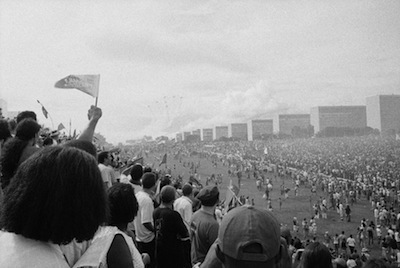
Mauro Restiffe: Empossamento #9 (2003), gelatin silver print; courtesy of the artist and Galeria Fortes Vilaça, São Paulo (see below for a note on the artist)
I'M FORTUNATE TO live and work in two great global capitals of culture: New York and São Paulo. And since I loathe heat and humidity, living in northern and southern hemispheres means I can maintain a comfortable existence by escaping either climate's summer heat. When one gets too hot, I move to the other.
On Sunday, June 30th, I departed JFK for São Paulo on my ninth annual getaway from New York's summer heat. And while in mid-air, Brazil's futebol (soccer) team won FIFA's Confederations Cup-- a series seen by many as the try-out for Brazil holding the World's Cup in 2014. Upon touchdown, I was greeted by a friend's phone call echoing with the chant of "Champions! Champions! Champions!"
Yes, I'm back in the Brazil I know and love. But surprisingly, in the days that followed, very few Brazilians spoke about their championship victory. What is on everyone's lips is a discussion of the political demonstrations that took place during the Confederations Cup games. It's as though the country has been shaken awake by a political earthquake. Everybody everywhere, under any circumstance, is talking about the country's nationwide protests and what they mean. From shopkeepers and cab drivers to artists and patrons, all are talking about the demonstrations, and all asking for this foreigner's perspective on what some have referred to as "When the Giant awakens."
The conversation came up again the other night at a chic dinner party, where an arts patron from a wealthy real estate family said everyone she knew is deeply disturbed and that there are even whispers about the possibility of the military taking power again. When I was asked what I thought, I said my only regret was not arriving one-week earlier so that I could join the demonstrations-- that as much as I adore Brazil and its people, I have come to learn that it is a profoundly unequal society in which the majority of its people live in a universe that is under-served, under-developed, and under-educated.
My pronouncement made a few jaws drop. My interlocutor responded that at a dinner party the previous evening she had been seated next to a distinguished French real-estate developer who has been spending several million dollars per month on a big real-estate project in the center of the city; she said that he is profoundly nervous about the current political climate. In fact, she said, he is so frightened by the recent political developments that he's thinking about pulling out of the entire development project and going back to France. To which I responded, "You should be so lucky that that French wimp flees Brazil, because when he does I know full well that you and your family will buy his entire real-estate holdings for a whopping discount!"
I meant it as a kind of critique--because therein lies the crux of the social and political problem here in Brazil. A tiny fraction of people own everything. Yet everyone has to pay huge taxes that seem to get siphoned off to support only the infrastructure of most powerful.
I have worked with and launched emerging artists on a daily basis for thirty years, and live in this emerging sector of the art world is much like riding a socio-economic elevator. I've entered more than 20,000 artists studios, many in the most appalling neighborhoods, and I've presented their work to leading contemporary art collectors in the most distinguished of homes. Through art I'm fortunate to participate in many of Brazil's social sectors, giving me a perspective on how the country seems to exist simultaneously in parallel universes that barely recognize each other's fears and concerns, let alone hopes and aspirations.
It's a privilege for me to live in Brazil and it's riveting being here at this historic moment as the country asks itself where it wants to go and how it will get there. It's a moment of profound introspection-- a tipping point. For several years now, Brazil has been obsessed with the up-coming international attention of the World Cup and Olympic Games, but the staggering cost of hosting these sporting events--and the unequal distribution of the revenues associated with them--has slowly begun to dawn on the populace at large. And people are pissed off. The Giant awakens!
A NOTE ON THE ARTIST
Mauro Restiffe is a São Paulo-based photographer who makes distinctive and highly granulated photographs in shades of gray. His photographs of Brasília in 2003 during the inauguration of Brazil's president Luiz Inácio Lula da Silva convey a timeless quality of an historic event that also suggests a potential field of protest that brilliantly prefigures the political demonstrations of the past month. Restiffe's most recent photographs were taken in São Paulo this past year at the site of a long abandoned and decayed Oscar Niemeyer building that has recently been restored as MAC-USP, the city's newest contemporary art museum.
Mauro Restiffe: Obra 5, 2012; photograph, gelatin silver print mounted on Dibond; courtesy of the artist and Galeria Fortes Vilaça, São Paulo
